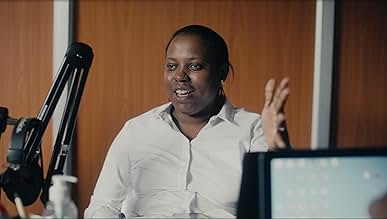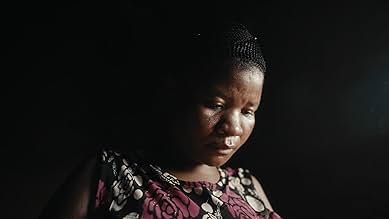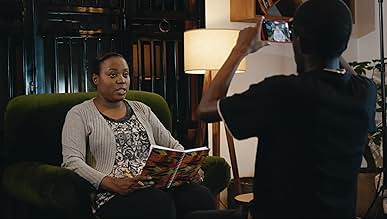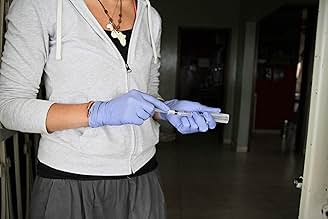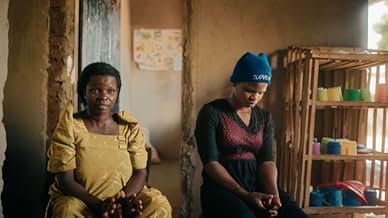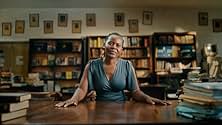Renee Bach è una missionaria americana che ha creato un ente di beneficenza per i bambini malnutriti a Jinja, in Uganda. Ma sono emerse accuse secondo cui Renee curava lei stessa bambini mal... Leggi tuttoRenee Bach è una missionaria americana che ha creato un ente di beneficenza per i bambini malnutriti a Jinja, in Uganda. Ma sono emerse accuse secondo cui Renee curava lei stessa bambini malati, senza avere alcuna qualifica medica.Renee Bach è una missionaria americana che ha creato un ente di beneficenza per i bambini malnutriti a Jinja, in Uganda. Ma sono emerse accuse secondo cui Renee curava lei stessa bambini malati, senza avere alcuna qualifica medica.
Sfoglia gli episodi
Recensioni in evidenza
Having read the existing reviews, I assumed that this was a story that had been told over and over again - Young white girls are feeling better by visiting Africa. *This is bad*.
And yes, it is, but it has delved into this issue a lot deeper than I expected from a product of the current USA culture wars.
These three episodes attempt (which is more than can be said for a lot of documentaries) to explain its subjects from a number of points of view.
Yes, it is about Africa, and it (without my personal experience) seems to represent its reality, and the reality of the people who live and work there reasonably well.
Yes, it's about US Christianity, and (maybe) presents the (in fairness) admirable traits that drive these missionaries to go to these countries that they have literally no clue about, other than the certain knowledge that the countries are in trouble and need help.
But what are these unspecial, unskilled, people really supposed to be doing (other than evangelising) in a country they know (literally) less than nothing about?
Yes, it is about how countries and cultures view each other (in general terms). If that doesn't interest you, skip it. If you appreciate that we live in an unequal world, but also that we are all humans dealing with global problems, then it is worth a watch (IMHO)
And yes, it is, but it has delved into this issue a lot deeper than I expected from a product of the current USA culture wars.
These three episodes attempt (which is more than can be said for a lot of documentaries) to explain its subjects from a number of points of view.
Yes, it is about Africa, and it (without my personal experience) seems to represent its reality, and the reality of the people who live and work there reasonably well.
Yes, it's about US Christianity, and (maybe) presents the (in fairness) admirable traits that drive these missionaries to go to these countries that they have literally no clue about, other than the certain knowledge that the countries are in trouble and need help.
But what are these unspecial, unskilled, people really supposed to be doing (other than evangelising) in a country they know (literally) less than nothing about?
Yes, it is about how countries and cultures view each other (in general terms). If that doesn't interest you, skip it. If you appreciate that we live in an unequal world, but also that we are all humans dealing with global problems, then it is worth a watch (IMHO)
This documentary is very informative, but not in the way the producers intended.
Most white people would see it and think that they should do better, but instead of listening, they should just watch, understand that you never help and always making a bad situation worse.
Never work against nature, never push the scale of evolution, you are just creating an unbalance with an impact beyond your life and ego.
Africa was in a perfect balance before white aid took hold. Misplaced altruism is always pathological, when you ignore your own tribe, what happens next to you, and go to help people on a different continent, you can be sure you are doing harm.
Most white people would see it and think that they should do better, but instead of listening, they should just watch, understand that you never help and always making a bad situation worse.
Never work against nature, never push the scale of evolution, you are just creating an unbalance with an impact beyond your life and ego.
Africa was in a perfect balance before white aid took hold. Misplaced altruism is always pathological, when you ignore your own tribe, what happens next to you, and go to help people on a different continent, you can be sure you are doing harm.
Renee took ontoo much based upon her missionary zeal. Her medical procedures were guided, not by science, but hearing the voice of God. Really sad commentary of misguided goal in an impossible situation. The condition of malnutrition, cultural deprivation, hunger, is really beyond what can be alleviated by well-meaning (misguided) attempts fo introduce Christian beliefs along with healing. The young girl hearing God's call was delusional, thinkinking she could make a difference. Should have just left the people alone, to deal with the crisis themselves. The nurse witnessed the mistakes in the hospital.
In HBO's Savior Complex, we're drawn into the intense, polarizing world surrounding Renee Bach, an American missionary whose medical work in Uganda sparked a firestorm of controversy. Renee's journey is full of good intentions and real results, and while her methods might have been unconventional, her dedication to helping the vulnerable in Uganda is undeniable. But instead of her work being fairly assessed, she became the target of an online activist group, No White Saviors (NWS), led by Kelsey Nielsen and Olivia Alaso. The more we watch, the clearer it becomes: this isn't about a nuanced conversation on aid and charity work. It's about tearing down a woman who was, in many ways, doing the best she could in challenging circumstances.
Let's get one thing straight: Renee was genuinely trying to make a difference. Her organization treated thousands of children, and while mistakes were made, her clinic's death rates were actually lower than those of many Ugandan hospitals. That's a crucial point the documentary highlights, which raises the question why is NWS hell-bent on painting Renee as a villain? If they truly cared about the children of Uganda, wouldn't they be focusing on pushing for broader medical resources, more government support, or any number of solutions that could actually benefit the community?
Instead, Kelsey and Olivia make it clear they want one thing: Renee's destruction. They aren't just critical of her work; they're out for blood. The lengths they go to, even calling for her to lose custody of her own children, cross a line from criticism to something personal and vindictive. Rather than a balanced critique, their campaign feels almost like a smear, fueled by an egregiously racist narrative that presumes ill-intent just because of her skin color and foreign status.
This isn't to say that Renee was perfect. But let's compare her outcomes to other healthcare facilities in the area. Statistically, Renee's clinic had a better record in terms of child mortality than local hospitals a fact conveniently ignored by NWS. Instead of acknowledging that she was working within limited resources and a fragile infrastructure, Kelsey and Olivia's activism focuses on making her the scapegoat. They paint her as a white savior, ignoring the positive impact she had on real lives. This isn't activism; it's a witch hunt, plain and simple.
The documentary reveals a disturbing side of online activism. NWS isn't advocating for Ugandan children they're looking for a headline. Their platform could have been used to demand more support for Uganda's healthcare system, to uplift local doctors and nurses, or to spotlight stories of children who need help. Instead, Kelsey and Olivia made it about vilifying one individual to suit their own agenda.
At its heart, Savior Complex challenges us to think deeply about what it means to help, to question the motives of people who claim to be champions of justice. For Kelsey, Olivia, and NWS, the motives seem clear: this wasn't about protecting Ugandan children. It was about getting attention, clicks, and clout at the expense of someone who, despite her flaws, was trying to actually make a difference.
Let's get one thing straight: Renee was genuinely trying to make a difference. Her organization treated thousands of children, and while mistakes were made, her clinic's death rates were actually lower than those of many Ugandan hospitals. That's a crucial point the documentary highlights, which raises the question why is NWS hell-bent on painting Renee as a villain? If they truly cared about the children of Uganda, wouldn't they be focusing on pushing for broader medical resources, more government support, or any number of solutions that could actually benefit the community?
Instead, Kelsey and Olivia make it clear they want one thing: Renee's destruction. They aren't just critical of her work; they're out for blood. The lengths they go to, even calling for her to lose custody of her own children, cross a line from criticism to something personal and vindictive. Rather than a balanced critique, their campaign feels almost like a smear, fueled by an egregiously racist narrative that presumes ill-intent just because of her skin color and foreign status.
This isn't to say that Renee was perfect. But let's compare her outcomes to other healthcare facilities in the area. Statistically, Renee's clinic had a better record in terms of child mortality than local hospitals a fact conveniently ignored by NWS. Instead of acknowledging that she was working within limited resources and a fragile infrastructure, Kelsey and Olivia's activism focuses on making her the scapegoat. They paint her as a white savior, ignoring the positive impact she had on real lives. This isn't activism; it's a witch hunt, plain and simple.
The documentary reveals a disturbing side of online activism. NWS isn't advocating for Ugandan children they're looking for a headline. Their platform could have been used to demand more support for Uganda's healthcare system, to uplift local doctors and nurses, or to spotlight stories of children who need help. Instead, Kelsey and Olivia made it about vilifying one individual to suit their own agenda.
At its heart, Savior Complex challenges us to think deeply about what it means to help, to question the motives of people who claim to be champions of justice. For Kelsey, Olivia, and NWS, the motives seem clear: this wasn't about protecting Ugandan children. It was about getting attention, clicks, and clout at the expense of someone who, despite her flaws, was trying to actually make a difference.
Watched it, I was expecting something different but what I saw was the same thing we see in America every day. White women tearing other white women down for their own gain. If you have to turn someone else's light out to shine, you don't deserve to have a light. There are morals and then there are decisions made for personal reasons. I will not be supporting any causes made to the Uganda moving forward. If I wanted white women tearing white women down, I could view that in my local church. I am a white woman by the way, Im just tired of it. I would not spend a single dollar to support her predecessors.
It's easy to sit and judge from your comfy American couch, but even when they we're criticizing her, I saw a woman trying to do good. Was it perfect, no. Do I think the documentary gave us the whole truth, no. I very much dislike the nurse, way more than the one who was at least making every attempt.
It's easy to sit and judge from your comfy American couch, but even when they we're criticizing her, I saw a woman trying to do good. Was it perfect, no. Do I think the documentary gave us the whole truth, no. I very much dislike the nurse, way more than the one who was at least making every attempt.
I più visti
Accedi per valutare e creare un elenco di titoli salvati per ottenere consigli personalizzati
Dettagli
- Colore
Contribuisci a questa pagina
Suggerisci una modifica o aggiungi i contenuti mancanti

Divario superiore
By what name was Savior Complex (2023) officially released in India in English?
Rispondi

